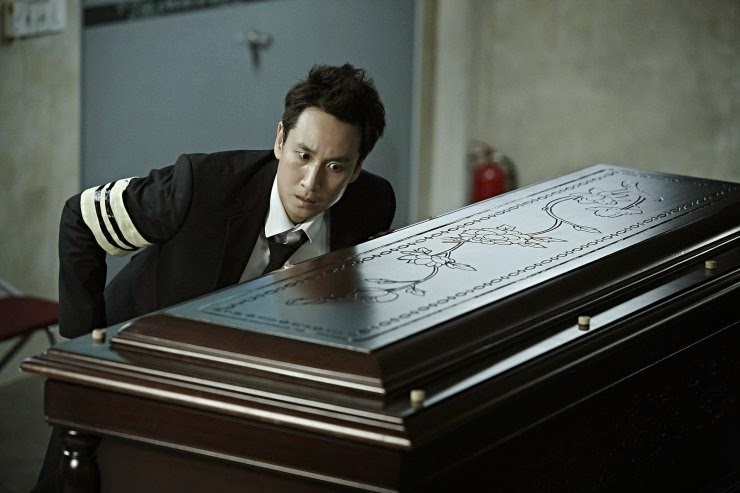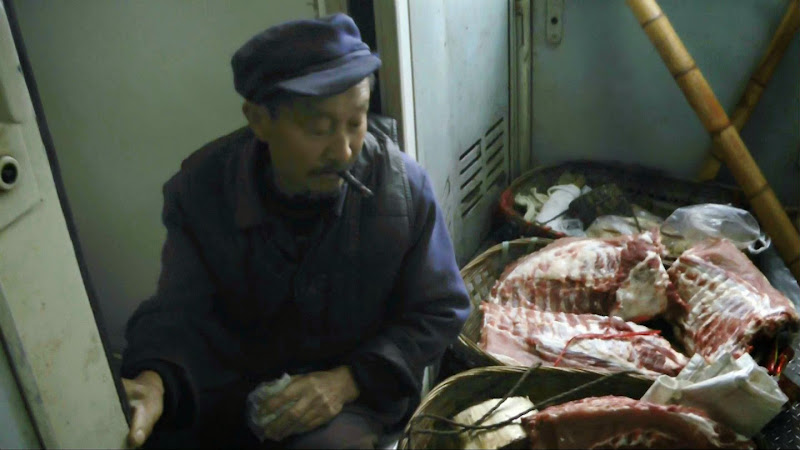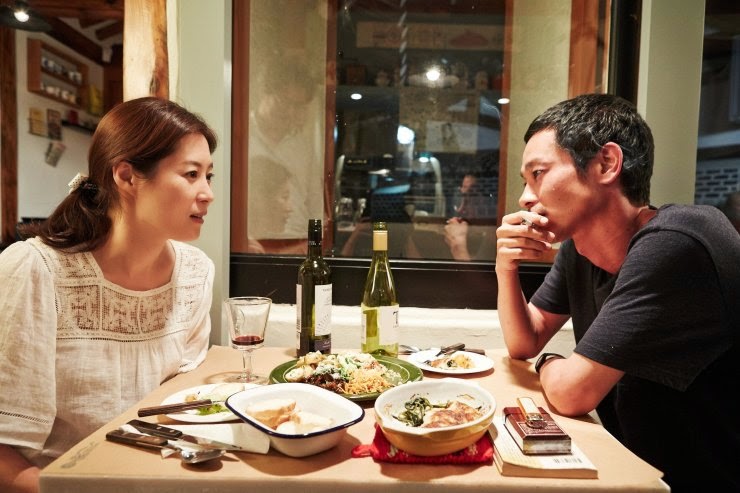Friday, April 17, 2015
The 58th San Francisco International Film Festival (SFIFF58)
The festival opens on April 23 with Academy Award-winning documentarian Alex Gibney's new film "Steve Jobs: Man in the Machine" (USA 2015 | 120 min. | Documentary) about, well, Steve Jobs. On May 2, the festival's centerpiece presentation is James Ponsoldt's "The End of the Tour" (USA 2015 | 106 min) about two celebrated writers, the late David Foster Wallace and David Lipsky. On May 7, the festival closes with Michael Almereyda's biographical drama "Experimenter" (USA 2015 | 90 min.) about the social psychologist Stanley Milgram who conducted human obedience experiments.
Besides these Big Nights, the SFFF58 categorizes its films into seven sections:
- Marquee Presentations—18 films that contain the top talent and buzz-worthy titles in the festival circle and in the film industry.
- Masters—12 works from renowned filmmakers around the globe.
- Golden Gate Award (GGA) Competition—19 narrative and documentary features films, as well as short films in six shorts programs, as the festival's official selection to compete nearly $40,000 in cash prizes.
- Global Visions—32 films that sample the best new works among filmmakers around the world.
- Dark Wave—four films for midnight horror thrill and silly laugh seekers.
- Vanguard—four experimental films that bring new and challenging cinematic experience.
- Added Programs—five added films that are not included in the above sections, nor in the printed film-guide.
Throughout the SFFF58, besides film screenings, there are also Tributes and Awards, as well as four Live & On Stage programs and three Master Classes.
The 58th San Francisco International Film Festival takes place April 23 - May 7, 2015 in San Francisco at Sundance Kabuki, Landmark's Clay Theatre, Castro Theater, Roxie Theater, and Brava Theater Center, in Berkeley at Pacific Film Archive, and other venues around the Bay Area.
Here is a list of my recommendations. As always, each film's title is linked to the festival program which has the showtime and venue information. Each film's still image is linked to a film's official Web site if it's available. In random order:
- A Hard Day (끝까지 간다 | South Korean 2014 | in Korean | 111 min.)
- The Iron Ministry (铁道 | China/USA 2014 | in Mandarin | 82 min. | Documentary)
- The Tribe (Плем'я | Ukraine 2014 | in Ukrainian sign language | 130 min.)
- Dearest (亲爱的 | China 2014 | in Mandarin | 130 min.)
- The Taking of Tiger Mountain (智取威虎山 | China 2014 | in Mandarin | 143 min.)
- Black Coal, Thin Ice (白日焰火 | China 2014 | in Mandarin | 106 min.)
- Red Amnesia (闯入者 | China 2014 | in Mandarin | 116 min.)
- Hill of Freedom (자유의 언덕 | South Korea 2014 | in English/Korean | 66 min.)
-
A Hard Day (끝까지 간다 | South Korean 2014 | in Korean | 111 min.)
The South Korean writer-director Kim Seong-hoon's (김성훈) sophomore feature is an immensely entertaining crime thriller "A Hard Day." When I first saw it on a tiny screen during an oversea flight last year, I was completely captivated by its sleek storytelling and charming humor. I am overjoyed to be able to see this film again on the big screen at the festival and to appreciate Kim's carefully constructed plot and to giggle at his jokes.
The detective Go Geon-soo (Lee Sun-kyun 이선균) isn't just having a hard day, he is probably having the worst day ever in his life. First of all, his mom is dead. On the way to a funeral home to seal his mom's coffin, he involves in an accident. At the same time, the Internal Affairs Department raids his office and found large amount of dirty cash in his desk. Because Go has been drinking before the accident, his effort to cover up the aftermath results in worse consequences. Just when he thinks he might have taken care of all the loose ends, somebody begins to come after him, hard. A bad day turns into a life and death battle.
Like the elegant style in many recent Korean films, the director Kim Seong-hoon hardly wastes any frame for unessential details. He scatters clues while unfolding the story and then make everything impeccably fit together. Popular Korean actor Lee Sun-kyun's performance is both comical and convincing playing the bad-luck detective Go.
The film's sense of humor is simple irresistible. When the credit starts to roll, the ring-tone music used by a cellular phone in the film will make you walk away with a big smile. The film is pure entertainment from start to finish.
-
The Iron Ministry (铁道 |
China/USA 2014 | in Mandarin | 82 min. |
Documentary)
Before high speed bullet trains become common in recent years, traveling by rail in China might be a both devastating and fascinating experience. It was noisy, dirty, smoky, and extremely crowded. Yet, it was also a place where you can strike up a candid conversation with complete strangers about sensitive subjects without worrying about getting into trouble. The American director J.P. Sniadecki's observant documentary "The Iron Ministry" provides a glimpse of that unique but fast disappearing experience.
Over a three-year period, the documentarian J.P. Sniadecki, who can speak Chinese, took numerous rides on China's railway system and captured large amount of footage on the trains. Some of the images are exotic and eye-popping. For example, it becomes rare these days to see peasants who board trains with gigantic baskets full of produces and fresh meat to be sold in the market.
Besides ordinary Chinese travelers on the train, the film also records many mesmerizing images both inside and outside a train that reflect the social, economic, and environmental changes in China. However, some of the scenes, such as a vending cart that travels in a crowded aisle, are unnecessarily and noticeably way too long.
After quite a few minutes into the film, there is no dialogue or voice-over in the sound track except the sound of the tracks. But just when I thought this might be another documentary in the same style as the compelling "Our Daily Bread" (Unser täglich Brot 2005), the travelers begin to talk in the film. That isn't a bad thing! Otherwise, we would have missed an amusing scene in which a naughty young boy recites a popular standup monologue (三八列车) in his cute voice pretending to be a public announcement.
The rapid transformation in China also dramatically changes the experience of railroad travel. Instead of chatting with each other in crowed and filthy space, modern travelers are usually preoccupied with their own hand-held devices in spacious high speed trains.
Although this film doesn't form an opinion or make a point of any sort, it does offers an eye-opening peek into the railway travel experience in China that's even hard to find nowadays.
-
The Tribe
(Плем'я | Ukraine
2014 | in Ukrainian sign language | 130 min.)
The Ukrainian write/director Miroslav Slaboshpitsky's (Мирослав Слабошпицький) triumphant feature directorial debut "The Tribe" is a must-see at the festival. Without a single word or a line of subtitle and superbly performed by a group of young non-professional deaf actors, the film unflinchingly tells an engrossing story about the barbarous life in a boarding school for the deaf.
Soon after a teenager Sergey (Grygoriy Fesenko) arrived at his new boarding school, he realizes that the school is an isolated brutal domain that is ruled by violence. He quickly joins the gang that routinely steals, robs, and pimps out two girls Anna (Yana Novikova) and Svetka (Roza Babiy) to truckers at night. When Sergey falls in love with Anna, things get complicated and out of control.
The director Miroslav Slaboshpitsky masterfully creates an astonishing cinema experience that's eerily raw and deeply compelling. This is probably a completely different movie to you if you understand Ukrainian sign language, but for most audience, it's an unforgettable film that will shake all of your senses, including hearing.
-
Dearest (亲爱的 |
China 2014 | in Mandarin | 130 min.)
A favorite to the SFIFF, the Hong Kong director Peter Chan (陈可辛) returns to the festival with his latest film "Dearest." This tear-jerking melodrama tells a heart-breaking story about the searching of a kidnapped child in China.
Based on a true event on 18 July 2009 in Shenzhen, three-year-old Pengpeng is kidnapped while playing on the street in his neighborhood. His divorced parents Tian Wen-jun (Huang Bo 黃渤) and Lu Xiaojuan ( Hao Lei 郝蕾) start an exhausting and desperate search for Pengpeng. The search leads them to cross the path with a local village woman Li Hongqin (Zhao Wei 赵薇) in Anhui Province, who is on the other side of the fence—she is trying everything possible to keep her child from being taken away by the child protection agency. Regardless of the outcome of the story, many grief-ridden hearts are vividly on display.
What's remarkable about this film is that even you are expected to be pampered by the director Peter Chan with sentimental materials, you can't help but to become deeply emotional while watching the melodrama unfold. The film's success is greatly due to a tour de force performance by the immensely popular actress Zhao Wei (赵薇), who speaks her native Anhui dialect in the film. She magically shakes your moral ground and makes her character sympathetic.
Unlike Hirokazu Koreeda's "Like Father, Like Son" (そして父になる 2013) which raises philosophical questions about parenting, this film exposes the harsh reality when parents lose a child.
-
The Taking of Tiger Mountain
(智取威虎山 |
China 2014 | in Mandarin | 143 min.)
Almost everyone in China knows the eight model operas and ballets (样板戏) from the notorious Cultural Revolution era. One of them is a Beijing Opera called "Taking Tiger Mountain by Strategy" (智取威虎山) based on true stories told in a novel by Qu Bo (曲波). Therefore, it's no surprise that everyone in China also knows the story line in this famous opera even for someone who doesn't know what happens in Romeo and Juliet. But considering how many films called Romeo and Juliet have been made over the years, it's surprising that the Hong Kong director Hark Tsui's (徐克) "The Taking of Tiger Mountain" is only the second time for this story to be told in a movie. But Hark Tsui doesn't adapt the story lightly. He makes the film with his action flick signature and turns it into a 3D extravaganza. On top of that, he even throws in an action sequence involving an airplane, just for fun.
The well-known story is about a heroic reconnaissance comrade Yang Zirong (Zhang Hanyu 张涵予) who single-handedly infiltrates into the compound of a brigand gang in the snowy Mountain Fierce Tiger (威虎山) in 1946. With his bravery and wit, Yang Zirong (杨子荣) gains the trust of the ruthless gang leader Hawk (Tony Ka Fai Leung 梁家辉) and becomes the ninth ranking officer in the gang. Based on the intelligence Yang Zirong collects, despite the extreme disadvantage due to the harsh environment and the imbalance in ammunition power, a small team of Chinese Army led by Shao Jianbo (Lin Gengxin 林更新) successfully attack and wipe out the bandits who have made the people's lives in the area miserable.
To add some new life to this legendary well-known story, the director Hark Tsui not only pitches in an airplane and plenty eye-popping action sequences in 3D, but also adds a new fictional character Qing Lian (Yu Nan 余男) who was taken by Hawk (座山雕) as his woman, separated from her son. Although the human drama element is formulaic, it's minor compared to the overall entertaining experience created by the genre master.
If you have missed the theatrical run a few months ago in the Bay Area, this maybe the last chance for you to watch this exciting revival of an iconic model opera, in 3D!
-
Black Coal, Thin Ice
(白日焰火 | China 2014 |
in Mandarin | 106 min.)
At last year's 64th Berlin International Film Festival, the Chinese writer-director Diao Yi'nan's (刁亦男) sleuth story "Black Coal, Thin Ice" (白日焰火) won the top prize Golden Bear, and the film's lead actor Liao Fan Liao Fan (廖凡) becomes the first ever Chinese actor winning Silver Bear for Best Actor. It's a little perplexing that this film has not been shown in the Bay Area yet until now at SFIFF58. But late is surely better than never and this award-winning film maybe still fresh to many local film goers.
The film opens in the winter of 1999 in Heilongjiang Province. When body parts of a murder victim are discovered at various coal plants, detective Zhang Zili (Liao Fan 廖凡) investigates this mysterious crime with his colleagues. The victim is identified as Liang Zhijun (Wang Xuebing 王学兵) whose wife Wu Zhizhen (Gwei Lun-mei 桂纶镁) works at a dry-cleaning shop. When an arrest goes wrong, two cops are killed and Zhang is injured. The case remains unresolved.
Five years later, Zhang Zili is no longer a detective and he works in the security department in a factory and drinks heavily. When he learns that another murder happens in the area, he decides to pursue the clues he discovers that link to the murder five years ago. The deeper he digs, the more surprising truth surfaces.
To have an ambiance of film noir, the director Diao Yi'nan arranges most scenes to happen at night or indoors, and in the film you cannot see the beauty of gorgeous and exquisite Harbin (where I grew up). It fits the gloom mood of just about every character in the film. Despite that the story unfolds during winter time, you won't see a trace of the famously breathtaking ice and snow festival. The film's striking image gives you chill all the way into your bone, as cold as the hearts of some of the characters.
Although that's remarkably effective, the storytelling is not so and actually confusing at times. If you don't understand the dialogue, you really need to pay close attention to the subtitles while its protagonist solves an overly complex puzzle.
If you miss a few clues during the first viewing, maybe you should go to a second screening to revisit them while marveling the filmmaker's craftsmanship.
-
Red Amnesia (闯入者
| China 2014 | in Mandarin | 116 min.)
Although it has been almost 40 years since the end of the Cultural Revolution in China, its immense impact on the lives of several generations still lingers. It also continues to be an important and fascinating subject for filmmakers to explore. By making a trilogy, renowned Chinese director Wang Xiaoshuai (王小帅) tells compelling story about the damage caused by the Cultural Revolution. Following his terrific "Shanghai Dreams" (青红 | 2005) and "11 Flowers" (我11 2011), the last installment of the trilogy is a thriller "Red Amnesia" about an elderly widow who struggles with an intruder she describes.
After competed for the Golden Lion at the 71st Venice International Film Festival, the film is shown at SFIFF58 even few days earlier than its opening day in China on April 30, 2015. Festival goers are in for a treat to see an outstanding performance by the 75-year-old Lü Zhong (呂中) as the widow Deng.
-
Hill of Freedom
(자유의 언덕 |
South Korea 2014 | in English/Korean | 66 min.)
A longtime SFIFF habitué, the South Korean prolific auteur Hong Sang-soo (홍상수) is a master of telling a story in an ordinary setting, often just letting his characters sit and talk at a bar or a restaurant. I identified two common characteristics of his films four years ago: he is obsessed about exploring the courtship of men toward women, and he loves to see his characters drinking. He continues to validate my theory when he returns to SFIFF with his latest film "Hill of Freedom." It's about a Japanese language teacher Mori (Kase Ryo 加瀬 亮) comes to Seoul to look for her ex-lover Kwon (Seo Young-hwa 서영화) who he met two years ago. He sits in a cafe (where else?) called "Hill of Freedom" owned by Young-sun (Moon So-ri 문소리) and writes love letters to Kwon.
After competed for the Horizons Prize at the 71st Venice International Film Festival last year, the film is labeled as Best Undistributed Films in 2014 by New Yorker and Indiewire. You know what that means to you—don't miss it at the SFIFF58 because it will not come to a theater near you any time soon. And, when you go to see the film, order a drink to your seat to set the mood just like the film's characters (if you are over 21 of course).








